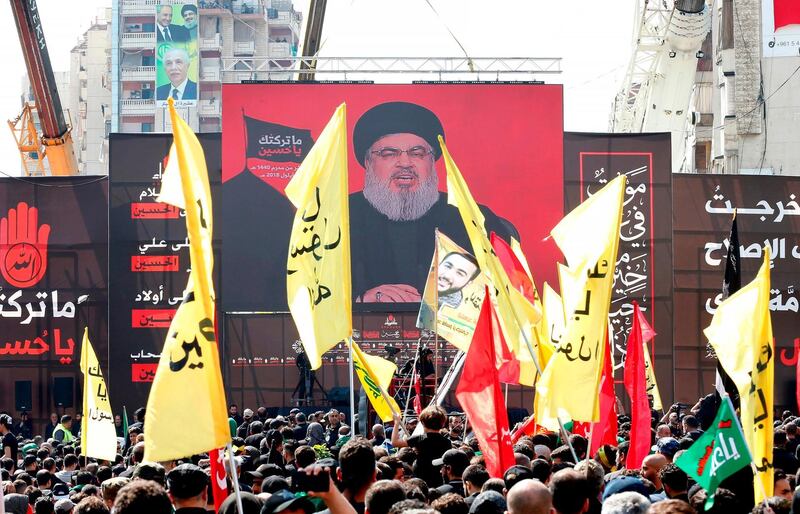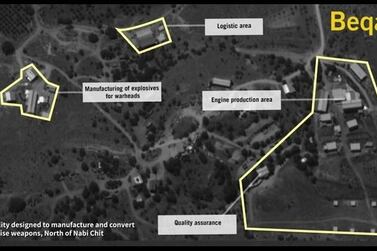A Lebanese man wanted by the US for allegedly supplying drone technology to Hezbollah once formed an aviation company in partnership with an Iraqi militant who has been sanctioned for assisting Iran's Revolutionary Guard, an investigation by The National has found.
Lebanese corporate records show that Samir Berro was a co-founder of Beirut-based Gulf Bird in 2007 along with an Iraqi national identified as Shibl Muhsin Obaid.
The National cross-referenced information provided on the Iraqi's ID document with US and Iraqi government data as well as the corporate documents to determine that the person in question is Shibl Muhsin Obaid Al Zaydi, the leader of the Iran-backed Kataib Al Imam Ali militia in Iraq.
In November 2018, the US Treasury Department sanctioned Mr Al Zaydi for working on behalf of the Islamic Revolutionary Guard Corps' Quds Force (IRGC-QF) to support Hezbollah.
Months earlier, the US unsealed an indictment against Mr Berro for conspiring to illegally export drone parts and technology to Hezbollah. He was charged along with two individuals arrested in South Africa but remains at large.
The indictment alleges that Mr Berro facilitated the transhipment of jet and piston engines from the United States to Hezbollah in Lebanon between 2009 and 2010. Mr Berro used his Dubai-domiciled SAB Aerospace company to send these engines to Lebanon, the indictment added.
A little over a year before these alleged activities, Mr Berro and Mr Al Zaydi as well as five others co-founded Gulf Bird, which was registered to own, charter and lease aircraft, according to business records obtained by The National. Mr Berro, who could not be reached for comment, does not appear to have formed any other companies in Lebanon.
Although the firm is registered for aviation services, Gulf Bird never applied for the certification needed to operate aircraft, the head of Lebanon's Directorate General of Civil Aviation, Mohammad Chehabeddine, told The National.
One of Gulf Bird's co-founders, former Iraqi parliamentarian Sami Al Askari, told The National that the company "did not go ahead" and was no longer in existence.
Corporate records show that while Gulf Bird was never dissolved, its board of directors have not made any filings since the firm’s incorporation.
Mr Al Askari distanced himself from Gulf Bird, saying that he “signed some papers” on behalf of a friend of his at the time who wanted to form an airline company in Lebanon.
The Iraqi politician said his business associate needed “someone with a European passport and asked me if I could help him”. Documents show that Mr Al Askari used his British passport to register as a founder of Gulf Bird.
Although Mr Berro also holds British citizenship, according to the US, he registered the company under his Lebanese nationality.
Mr Al Zaydi, who owns 49 per cent of Gulf Bird’s shares, has allegedly conducted illicit activities in Lebanon, according to the US Treasury.
He “maintained close business ties” with Hezbollah officials and was a partner and founder in Lebanon-based company Global Cleaners S.A.R.L, which was sanctioned by the US in 2016 for being controlled by an alleged Hezbollah financier.
The US Treasury also said that “Al Zaydi has served as a financial co-ordinator between the IRGC-QF and sectarian armed groups in Iraq and assisted in facilitating Iraqi investments on behalf of IRGC-QF Commander Qassem Soleimani”.
“Al Zaydi has appeared publicly with IRGC-QF Commander Qassem Soleimani at least four times,” the statement added.
At the time of Gulf Bird's formation, Mr Al Zaydi was a militant with the Iraqi cleric Moqtada Al Sadr's Mahdi Army, according to Washington Institute fellow Philip Smyth. He "grew a strong Baghdad and south-central Iraq-focused network" of fighters that "functioned as death squads," Mr Smyth told The National.
Mr Smyth, who closely follows Shiite militias in Iraq, said Hezbollah sent experienced trainers to Iraq to build connections with the Mahdi Army and “to support elements that demonstrated stronger anti-American tendencies”.
Mr Al Sadr restructured the Mahdi Army in 2008 as splinter groups emerged from the fighting force. Mr Al Zaydi was expelled from the Sadrist political movement and developed, with extensive Iranian aid, what would become Kataib Al Imam Ali in 2014 out of the splinter groups, Mr Smyth said.






